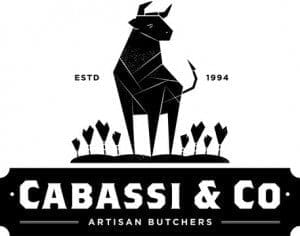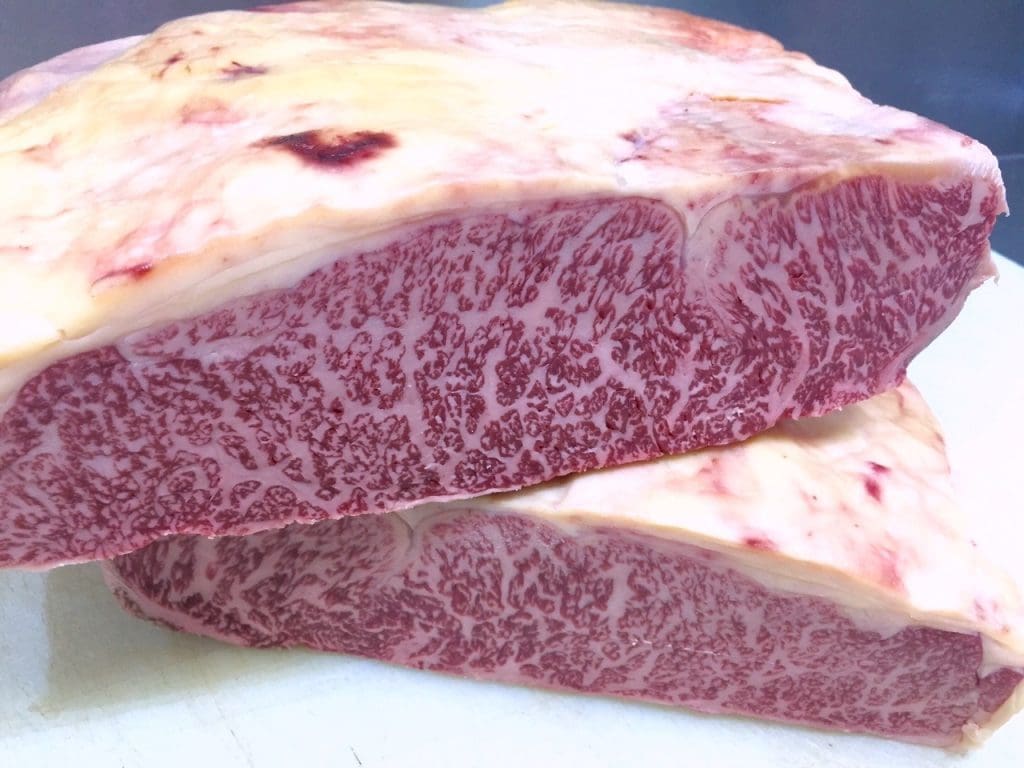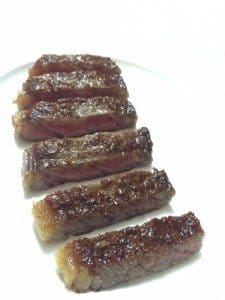TWO hundred and nineteen dollars and ninety-nine cents.
We’ve deliberately spelt-out that number, for dramatic effect.
It’s the price per kilogram being asked for what Beef Central believes may be the most expensive, and arguably highest quality grassfed beef ever sold in Australia.
Brisbane high-end retail butchery, Cabassi & Co has unearthed a single carcase perhaps unique in Australian beef production history. It’s from a Fullblood Japanese Wagyu steer, grassfed for four years on high quality pasture outside Melbourne, which as this image shows, has produced truly prodigious marbling.
A marbling score of 9+ like this is normally associated only with the very best longfed Wagyu that have spent the previous 500-600 days on specialised Japanese grain-based rations in a feedlot.
But this animal has done it on pasture – granted, with a little grain-based paddock supplement thrown in along the way – but essentially “spending its life roaming on the side of a grassy knoll.”
Cabassi & Co’s Pete Cabassi, who has bred, fed and eaten Wagyu for close to 20 years, says he has never seen or tasted grassfed beef of this quality.
Fullblood Wagyu feeder cattle (representing less than 5 percent of all Wagyu beef produced in Australia) are almost universally consigned to longfed feedlot programs, in order to guarantee the expression of their marbling potential.
Even the handful that have been grassfed have never produced a marbling score like this carcase.
“The calf was bred, grown and nurtured over four years on a little slice of heaven near Glen Alvie on the east side of Melbourne,” Pete Cabassi explained.
“The family who bred him run an embryo transfer facility, and this calf was one of a small group raised alongside a rotational herd of Wagyu donor cows,” he said.
“Grassfed Wagyu typically produces marbling in the mid-ranges around 4-6, but never, in my experience, at the extreme 9+ end of the spectrum like this.”
“This carcase may in fact be unique. I’ve certainly never seen anything like it from a grass fed animal.”
While grassfed Wagyu often lacks the ‘Wow Factor’ associated with heavily-marbled grainfed samples, Mr Cabassi said the early samples from this carcase he had tried tasted ‘first class.’
“It blew me away when I first sampled it. I rate samples against a panel of reference assessments, plotted against other premium Wagyu products we sell, including flavour, juiciness, oiliness, texture, sweetness/sourness. It rated exceptionally well against our 600-day grainfed samples,” he said.
“It did not have quite the sweetness of long-grainfed, and was a little bit oilier, but not in an unpleasant way. Premium long grainfed Wagyu tends to be both juicy and ‘clean’ on the palate. Heavier grassfed Wagyu, which is from older animals – tends to be a little oily in the mouth. This sample did not carry that trait – it stunned me, and ate a lot better than I expected.”
“A couple of very good years in the paddock, supplemented with just a little grain, has produced an extraordinary product,” he said. “It represents what we have thought for a while now: that there are a few pathways to achieving a stunning end product with Wagyu. This method relies on growing the marbling for longer under less intensive nutritional support.”
Massive cut size
Both the boneless sirloin and boneless rib fillet are being retailed in the Cabassi & Co outlet at Indooroopilly this week for $219.99/kg – a price seen as good value for money, given the uniqueness of the product.
The carcase weighed 489kg in the chillers, a reflection of his sire, TF Itozurudoi 151, roughly 50:50 Tajima:Shimane genetic lines. Itozurudoi 151 was one of the original Takeda imports, now deceased, but continuing to exert a genetic influence through AI and ET. To put that carcase weight into some context, 100-day grainfed programs in Australia typically produce average carcase weights of 340-360kg.
By nature of the extremely large carcase size, the striploin samples in the photo above measure more than 24cm (11 inches) across. As a result, a single striploin portioned steak cut at just 10mm in thickness weighs 275grams, and sells for around $60.
“But in our view a steak that size comfortably serves two people willing to indulge in carnivorous perfection, equating to only $30 per person,” the butchery told its email subscriber customer network yesterday.
Sample provides ‘proof of concept’
Readers should not expect quantities of similar product to come on the market any time soon, however.
“This particular example is more of a proof-of-concept,” Mr Cabassi said. “It shows it is possible to achieve extreme abundance of marbling in grassfed Wagyu. It takes extra time, but if it’s done right, all the desirable flavour qualities associated with extreme high quality Wagyu beef can be retained.”
For Cabassi & Co, making a ‘fuss’ over this unique, single carcase sample is really about seeing how its valued customers respond.
“It’s a bit of a test case among our customers that we already know are big fans of grainfed Wagyu, to see what they think of it, and get some feedback,” Mr Cabassi said.
The risk in holding Wagyu cattle on grass pastures for such prolonged periods lies in the carcase value if the animal does not marble at the end of the cycle.
“If they produce the marbling, like this calf did, then the venture could pay off. But if this calf had opened up as a marbling score 4 or 5, after four years, there would have been nothing in it,” he said.
“We’ve done the breakevens on this carcase, and he came in at $6.75/kg, carcase weight, after being processed & packed into primal cuts.”
Is there more similar beef in the pipeline? Difficult to forecast, but Mr Cabassi has more calves on the ground and in-utero, carrying exactly the same breeding.
“It does make for an anxious but exciting wait for the next three years” Mr Cabassi said.
 With only 12kg of sirloins plus 10kg of rib fillet remaining for sale from this unique Wagyu steer (some has already been distributed to VIP customers), Cabassi & Co is taking limited orders. Anybody wishing to sample a slice of history should promptly phone the Indooroopilly store on 07 3378 5995.
With only 12kg of sirloins plus 10kg of rib fillet remaining for sale from this unique Wagyu steer (some has already been distributed to VIP customers), Cabassi & Co is taking limited orders. Anybody wishing to sample a slice of history should promptly phone the Indooroopilly store on 07 3378 5995.
- Can readers provide evidence of a higher grassfed beef price ever charged at retail in Australia? If so, we’d be keen to hear from you, via our comments panel below.



Hi I was suprise
You are hi good marble wagyu beef grass fed
Well I got wagyu shop in Melb
But. Not appointment with you
Good day http://www.kazwagyu.com.au
Peter, I can taste the oily sweetness and tenderness in my mouth just reading this article. Well done, congratulations.
JEZ EXPENSIVE BBQ.?